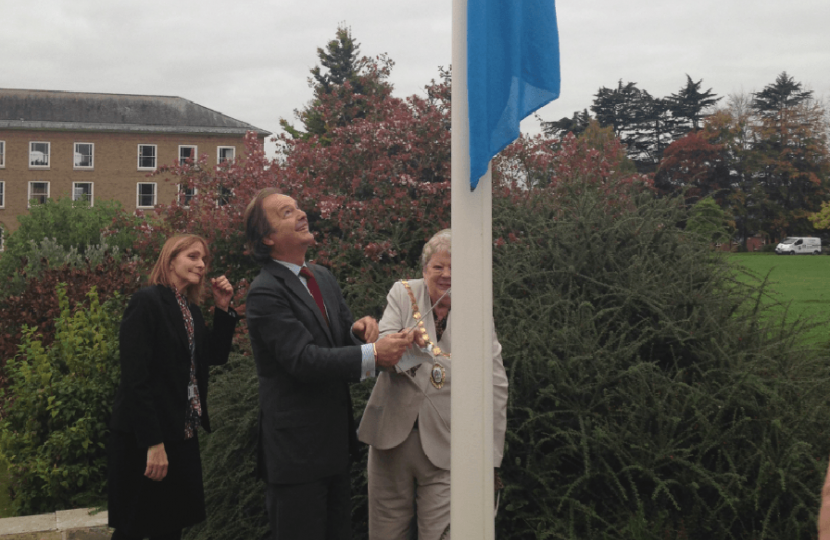
On Friday 23 October - United Nations Day - local political leaders raised the UN flag over County Hall, Exeter, to mark the 70th anniversary of the UN.
Felicity Bourne, the Chair of the Exeter United Nations Association, was joined by Devon County Council’s Chairman, Cllr Christine Channon, Council Leader, Cllr John Hart, Hugo Swire MP, the Lord Mayor of Exeter, Olwen Foggin and representatives of Devon’s Youth Parliament.
United Nations Day celebrates the birth of the United Nations in 1945.
It marks the day that the United Nations Charter came into force after its conception earlier in the year.
The Charter was ratified by the five permanent members of the Security Council; France, the Republic of China, the Soviet Union, the United Kingdom and the USA.
It became known as United Nations Day in 1948 and is a day that celebrates and reflects on the good work of the UN.
The United Nations helps to maintain international peace and security, develop friendly relations among nations and promote better living standards and human rights.
Hugo Swire, MP for East Devon, said: “I am pleased to be here today as the local MP and as a Foreign Office Minister. It is entirely appropriate that we mark the United Nations on this anniversary. As the Chairman of the Exeter UN Association said, the organisation has never been needed more than it is today.”
The Chairman of the Exeter UN Association, Felicity Bourne said:
“It is a pleasure to be here today to witness the raising of the UN flag and to celebrate the 70th anniversary of the formation of the UN, 1945 to 2015. I should like to thank Devon County Council most warmly for having once again made this ceremony possible.
“One of the three main issues faced by the UN this year has been the Ebola outbreak. The UN’s World Health Organisation finally this year brought the Ebola outbreak under control. The WHO recorded more than 4,000 deaths and nearly 14,000 cases. No confirmed cases were reported for the last two consecutive weeks in October. But some high risk contacts remain.
“Global Climate Change has long been a major problem for the UN. However, in December this year a conference in Paris seeks a binding and universal climate change agreement from the nations of the world, which would put the world back on track to reduce global emissions by at least 60 per cent below 2010 levels by 2050.
“And on the most pressing problem of refugees, António Guterres, UN High Commissioner for Refugees said of the present problem, ‘For me, the choice is clear. Either allow the cancer of forced displacement to spread, or manage the crises together.’ We must not fail.
“As we look back to the years of the Millennium Development Goals, it is encouraging to see just how effective they have proved to be.
“The success of the MDGs has been responsible for lifting millions of people out of poverty, empowered women and girls and improved health and wellbeing. Extreme poverty has declined by more than half – falling from 1.9 billion in 1990 to 836 million in 2015. More girls are in school and the number of women in parliament has increased. The rate of children dying before their 5th birthday has declined by more than half. Worldwide 2.1 billion have access to improved sanitation.
“Targeted investments in fighting diseases such as malaria, HIV/Aids and TB have brought unprecedented results. Millions of lives have been saved. Progress is uneven across regions and countries and despite enormous progress driven by the MDGs, 800 million still live in extreme poverty and hunger. But the MDGs have opened the gateway for further developments – to the new sustainable development Agenda 2016.
“Yes, the world still needs the United Nations, and at the moment, more than ever.”
